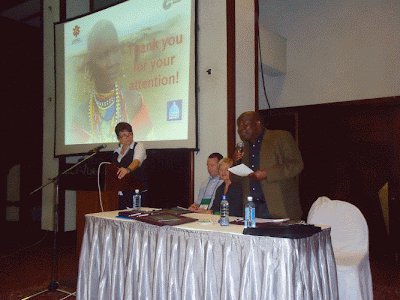I recently organized a seminar on Agricultural Information Management and Knowledge Exchange in ECOWAS (Economic Community of West African States) countries in Akosombo, a small town in the east of Ghana in the Eastern Region and the site of the Akosombo Dam. I invited senior officers responsible for information management and dissemination functions in Ministries of Agriculture to discuss the impact and the resulting policy and strategy implications of modern information and communication technologies on agricultural information management, dissemination, and knowledge exchange in their ministries.
 |
| Workshop participants |
The participants came from Benin, Burkina Faso, Cape Verde, The Gambia, Ghana, Guinea, Guinea Bissau, Liberia, Mali, Niger, Nigeria, Senegal, Sierra Leone, and Togo. Only Côte d'Ivoire was not represented at the seminar. They included directors or officers in charge of ICT, Archives, Libraries and Documentation, Communication and Public Relations, and Agricultural Statistics.
From the ensuing discussions it was evident that there is an absence of appropriate policies to facilitate information management and dissemination and a general lack of investments in digital agricultural information management and dissemination activities. The result is that a lot of emphasis is being placed on print-based information resources which by default are limited in circulation. In most instances very few copies of print documents are produced, mainly as grey literature, and are rarely documented making difficult to know what is available in the Ministry.
The absence of coordination among the units or departments involved in the collection, management and dissemination of information was also a major concern for some participants. They indicated that in some cases communication units and IT departments do not coordinate their activities regarding content generation for the Ministry’s web site.
The participants agreed that social media has a role to play in information dissemination and knowledge sharing. However, official use of social media tools in Ministries of Agriculture was said to be very limited. Some ministries are experimenting with social media, especially with Facebook. But without social media strategies in place, such experiments are doomed to fail.
While some Ministries of Agriculture (i.e. Ghana, Liberia, Nigeria and Senegal) have developed websites, the discussions revealed that provision of content on the websites is erratic, and is a major challenge. Most websites do not provide access to full-text documents produced by the Ministries due to the absence of policies on digital information resources dissemination. In some cases, up-loading documents to the website takes longer than necessary because of weaknesses in the internal work flows for digital content management.
 |
Agriculture statistics graphs
from CountrySTAT |
One aspect of information management that is doing quite well in the region is agricultural statistics. Countries such as Benin, Burkina Faso, Ghana, Gambia, Guinea Bissau, Niger, Nigeria, Senegal and Togo have been assisted by the Food and Agriculture Organization (FAO) to develop their capacity to provide reliable statistical data on food and agriculture, necessary to monitor national trends. This was done under the CountrySTAT initiative, and they all have websites where agricultural related statistics are publicly accessible.
If Africa is to fight poverty with information and knowledge, easy access to relevant information, such as information for agricultural and rural development, is critical. Ministries of Agriculture can easily make their information accessible if they managed and disseminated their information resources in digital information. To achieve this, they will have to put in place policies and strategies conducive for digital information management and sharing, and invest in both institutional and individual capacity development.
------
Justin Chisenga, PhD
Food and Agriculture Organization (FAO)
Regional Office for Africa
Accra, Ghana





























